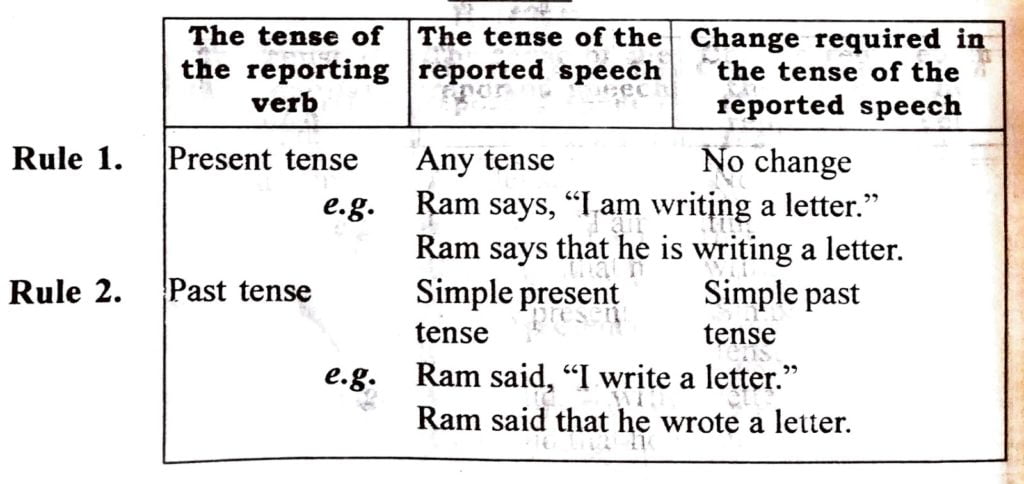Class 9 English Grammar Change of Narration, NCERT/SCERT Class 9 English Grammar Notes to each Syllabus wise provided in the list of SEBA Class 9 English Grammar Change of Narration (Direct and Indirect Speech) can be of great value to excel in the examination.
Class 9 English Grammar Change of Narration (Direct and Indirect Speech)
Class 9 English Grammar Change of Narration Notes cover all the exercise questions in Assam Board SEBA Textbooks. The SEBA Class 9 English Grammar provided here ensures a smooth and easy understanding of all the concepts. Understand the concepts behind every chapter and score well in the board exams.
CHANGE OF NARRATION (Direct and Indirect Speech)
GRAMMAR
DIRECT SPEECH
When we give the exact words of the speaker by way of quotation, it is known as Direct speech.
e.g. Ram said, ‘I am sick.
In the above sentence the verb ‘said’ reports the speech of the person. Hence it is known as ‘Reporting verb’.What is said by the person ‘I am sick’ is known as Reported Speech.
Direct speech has following features:
1. The reported speech is enclosed within inverted commas (” “).
2. The reported speech is separated from the reporting verb by comma.
3.The first word of the reported speech begins with a capital letter.
INDIRECT SPEECH
When we give the substance of the actual words of the speaker, it is known as Indirect speech.
E.g. Ram said that he was sick.
The above sentence is not the exact words of the speaker. Its substance has been reported in the words of the reporter. Since the speech is given indirectly it is known as Indirect speech.
RULES



Rule 11. If the interrogative sentences in the direct speech are formed by question words such as-what, which, who, etc. then the same question words are used in the indirect speech.
e.g. Ram asked me, ” What is your name?”
Ram asked me what my name was.
Rule 12. If the interrogative sentences in the direct speech are formed by auxiliary verbs such as – are, will, can, is, etc. then if or whether are used in the indirect speech.
e.g. Ram asked Tom, ” Can you sing a song?”
Ram asked Tom whether he could sing a song.
Rule 13. Imperative sentences of the direct speech are changed into indirect speech by changing the reporting verb into request, order, command, advice, etc. and by putting the sentence in the infinitive.
For Imperative sentences – add ‘to’
e.g. Ram said to Hari, “Sit down.”
Ram ordered Hari to sit down.
Rule 14. Exclamatory and Optative words of the direct speech are changed into indirect speech by using suitable words which express exclamation, wishes or prayer and by changing the sentences into assertive sentence.
e.g. Oh, well, hurrah, alas, bravo, etc. Use words which suit the expression contained in the sentence.
Ram said, “Goodbye, my friends.”
e.g. Ram bade his friends goodbye.
Rule 15. Words expressing nearness are changed into words showing distance.
| Direct | Indirect |
| ago | before |
| now | then |
| here | there |
| come | go |
| hereby | thereby |
| hither | thither |
| these | these |
| hence | thence |
| tomorrow | The next day |
| today | that day, the following day |
| last night | the previous night |
| last week | the previous week |
| yesterday | the previous day |
| next day | the following day |
| tonight | that night |
| next month | the following month |
| can | could |
| this | that |
Exercise:
Change the following Direct speech into Indirect speech:
(i) He said to me, “What are you doing?”
(ii) The Judge said to him, “Call the first witness.”
(iii) Ramu said to Tom, “Tomorrow is my birthday.”
(iv) He says, “I am very sorry.”
(v) Sita said to Mary, “I have a stomach ache.”
Ans: (i) He asked me what I was doing.
(ii) The judge ordered him to call the first witness.
(iii) Ramu told Tom that his birthday was on the next day.
(iv) He says that he is very sorry.
(v) Sita told Mary that she had a stomachache.
Change the following Indirect speech into Direct speech:
(i) The student respectfully asked if he might go out.
(ii) Mr Naren asked me where I was going.
(iii) Meena wished her teacher, good morning.
(iv) He prayed that God might save the queen.
(v) The captain commanded his men to halt.
Ans: (i) The student said, “May I go out?”
(ii) Mr Naren said to me, “Where are you going?”
(iii) Meena said to her teacher, “Good morning”.
(iv) He said, “May God save the queen.”
(v) The captain said to his men, “Halt!”.
Some Previous Years’ Questions
1. He said, ‘I have finished my work’.
2. Anil said to Hari Singh, “Can you cook ?”
3. He said “Where does the man live ?”
4.The man said to me, “Do you play tennis” ?
5. The man said to me, “Are you a student ?”
6. “I know you well,” the man said to me.
7. He said to me, “Where is your book ” ?
8. He said to me, “Why did you do it ?”.
9. He said to me, “I know you.”
10. The teacher advised Reba not to waste her time.
11. Arun said, “I don’t know this boy” ?
12. “I made some money yesterday”, Anil said.
13. I said to him, “Where are you going at this time ?”
14. The man ordered his servant to leave the room.
15. The man asked me if I was free at that time.
Ans: 1. He said that he had finished his work.
2. Anil asked Hari Singh if he could cook.
3. He asked where the man lived.
4.The man asked me if I played tennis.
5. The man asked me if I were a student.
6. The man told me that he knew me well.
7. He asked me where my book was.
8. He asked me why I had done it.
9. He told me that he knew me.
10. The teacher said to Reba, “Do not waste your time”.
11. Arun said that he did not know that boy.
12. Anil said that he had made some money the previous day.
13. I asked him where he was going at that time.
14.The man said to his servant, “Leave the room.”
15. The man said to me, “Are you free now ?”

Hi, I’m Dev Kirtonia, Founder & CEO of Dev Library. A website that provides all SCERT, NCERT 3 to 12, and BA, B.com, B.Sc, and Computer Science with Post Graduate Notes & Suggestions, Novel, eBooks, Biography, Quotes, Study Materials, and more.






